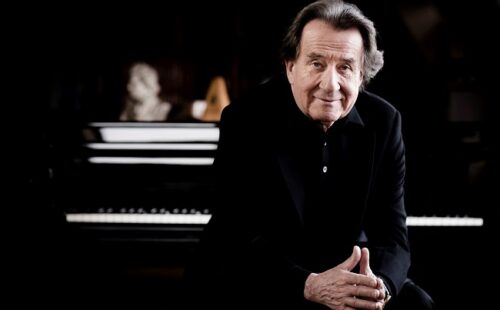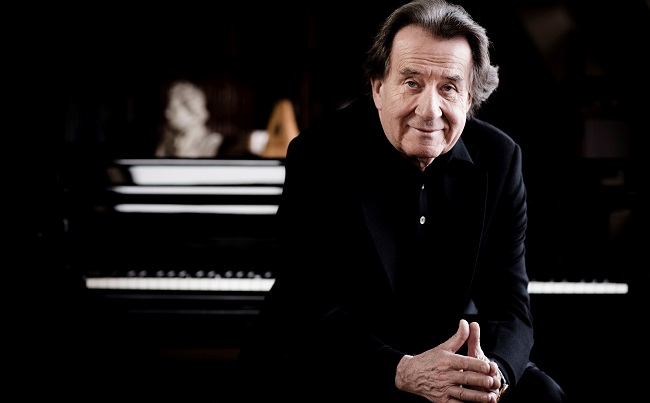 Switzerland Pärt, Beethoven, Bruckner: Rudolf Buchbinder (piano), Tonhalle-Orchester Zürich / Paavo Järvi (conductor). Tonhalle, Zurich, 27.10.2022. (VL)
Switzerland Pärt, Beethoven, Bruckner: Rudolf Buchbinder (piano), Tonhalle-Orchester Zürich / Paavo Järvi (conductor). Tonhalle, Zurich, 27.10.2022. (VL)

Pärt – Cantus in Memory of Benjamin Britten for string orchestra and bell
Beethoven – Piano Concerto No.4, Op.58
Bruckner – Symphony No.6, WAB 106
The Tonhalle-Orchester Zurich presented its audience with a veritable feast for the ears. We started with a work by Paavo Järvi’s close friend Arvo Pärt, followed by works by Beethoven and Bruckner. Not only was a broad spectrum of epochs covered, the mixture of different musical forms such as symphony and piano concerto left nothing to be desired.
Pärt’s works regularly find their way into the programme of the Tonhalle-Orchester Zurich, and quite rightly so – the Estonian conductor surprises with a sheer force in the most diverse compositions.
The Cantus in Memory of Benjamin Britten was composed, as the name suggests, in memory of Benjamin Britten, whom he greatly admired but unfortunately was never able to meet in person. The composition comes at a time when Pärt considered himself mature enough to recognise the significance and magnitude of such a loss.
The piece itself begins in absolute silence, which is then interrupted by delicate bell sounds, at first hardly recognisable as such, but which become more prominent as the piece progresses. The strings begin, playing descending tone sequences repeatedly, so perfectly coordinated and flowing into each other that the listener feels a sense of infinite depth and heaviness and at the same time a sense of flight, of a deep fall. Strong emotions are triggered and the composer’s intention becomes clear. It was intensely moving.
Rudolf Buchbinder is regarded as one of the leading interpreters of Beethoven’s works and is perhaps for this reason also described as his most loyal fan. He has never studied any composer as intensively as he has studied Beethoven. The Austrian pianist is also very familiar with the Tonhalle-Orchester Zürich: in 2019 they both gave a guest performance in Warsaw on the occasion of the Beethoven Easter Festival.
Beethoven’s Piano Concerto No.4 is not only one of the most special piano concertos composed at the time, but also to this day. He composed the concerto around 1805 during his ‘heroic period’. This was the most productive phase in his creative biography, despite his hearing impairment, during which he developed his unique style. Beethoven performed the piece himself in 1808 at the Theater an der Wien. It was to be Beethoven’s last concert at which he himself performed in public as a pianist – the agony of his hearing condition was increasing.
What makes the piece so special: Beethoven lets the solo voice start the concerto alone. This is followed by a gentle use of the strings, which swell powerfully in the movement’s further course to unleash their full volume. Järvi conducts with his usual strength, loud, without however ever becoming too loud, powerful, determined, only to lapse into gentle lightness again shortly afterwards, so that the solo voice is given a way to re-enter after a break of about 70 bars. Compared to other interpretations, Järvi does not fall into an intermediate lethargy, rather he pays attention to a constant, moderate tempo and thus does perfect justice to the Allegro Moderato.
The strings provide a strong opening to the second movement. Here, too, Järvi does not spare energy to form a stark contrast to the gentle solo voice of the piano. In this way, he reinforces a characteristic of Beethoven: the tutti and solo voices are virtually never heard together. While the orchestra creates an energetic, sombre mood, the piano counters it gently. The background of the work has been assumed to be, among other things, about Orpheus and his tale of woe. This drama is particularly evident in this second movement.
The longed-for harmony is then brought to the listener in the third movement. Solo voice and orchestra finally find each other in the style of the gentle and harmonic motifs of the solo voice in the previous movements.
It was truly a feast to watch the pianist let his hands fly over the piano keyboard with such ease. There was hardly a touch to be discerned, the movements and the resulting sequences of notes were so fluid, so harmonious, that this picture perfectly rounded off the listening experience. At times, the diligent tone sequences were reminiscent of Saint-Saëns’s Aquarium from Carnival of the Animals. As an encore, Buchbinder played the finale from Beethoven’s Tempest Sonata.
After the break, Bruckner’s Sixth. For many, this symphony marks a turning point in Bruckner’s creative process – it is the first symphony that he did not revise, he considered it perfect. He describes it as his ‘sauciest’. Since the beginning of 2022, the Tonhalle-Orchester Zurich has been performing a Bruckner cycle under the direction of Paavo Järvi, which is to extend over several seasons.
In the first movement, powerful and heroic tone sequences are heard almost straight away. Already after about five minutes, one finds oneself in a musical complexity – at this moment, six layers of rhythmic layering take place simultaneously. That sort of thinking – and that sort of sound – blows out of the water the idea that Bruckner was writing pieces that were rough-hewn or unfinished. Throughout the movement, the lovely flute played by Sabine Poyé Morel was particularly audible.
The Adagio is one of Bruckner’s most heart-breaking slow movements. It contains a repetitive melody strongly reminiscent of a funeral march. Right at the beginning, a plaintive oboe is heard, wonderfully performed by oboist Simon Fuchs. We hear powerful brass, and Järvi once again knows how to play skilfully with the tonal strengths.
The boldness mentioned at the beginning is perhaps nowhere more evident than in the third movement, the Scherzo. Especially for its atmosphere of feverish harmonic ambiguity and almost grotesque textural contrasts: the unsettling pounding of the cellos and double basses, the scratchy staccatos in the violas and second violins; the glittering filament of the high unison line in the woodwinds; and those searching arpeggios in the first violins that seem to dream of a harmonic stability that the rest of the orchestral texture stubbornly refuses to embrace – all in the first ten bars.
The Finale gifts us with delicate strings and alternately powerful-sounding brass, at the end of which, Bruckner leaves us somewhat unsatisfied: all the tangles that have been spun so far do not come together as expected towards the end of the movement and so the symphonic drama seems to remain open.
In a very recent article in the Neue Zürcher Zeitung, Järvi explains that he has a mission: to make the Tonhalle Orchestra one of the world’s greatest. The concert this evening was rewarded with standing ovations, proving that the Tonhalle-Orchester is well on the road to achieving Järvi’s objective.
Valérie Litz

Amazing! Sounds like it was quite an experience. Very vivid descriptions, I like it.
Very well written review! Looking forward to the next one, with the hope of having the chance of attending such concerts in person.
[In my opinion] It was a very mediocre Beethoven performance, really; routine… not bad and decidedly not good and very lackluster.